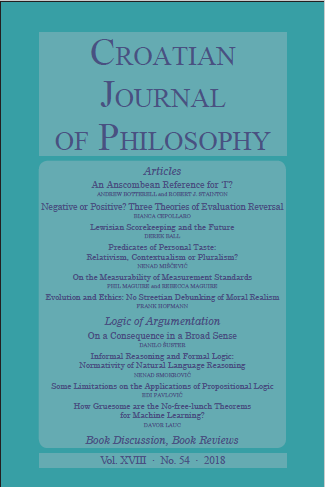Informal Reasoning and Formal Logic: Normativity of Natural Language Reasoning
Informal Reasoning and Formal Logic: Normativity of Natural Language Reasoning
Author(s): Nenad SmokrovićSubject(s): Epistemology, Logic
Published by: KruZak
Keywords: Logic; real-life reasoning; normativity; deductive reasoning;
Summary/Abstract: Dealing with deductive reasoning, performed by ‘real-life’ reasoners and expressed in natural language, the paper confronts Harman’s denying of normative relevance of logic to reasoning with a logicist thesis, a principle that is supposed to contribute for solving the problem of incongruence between descriptive nature of logic and normativity of reasoning. The paper discusses in detail John MacFarlane’s (2004) and Hartry Field’s (2009) variants of “bridge principle”. Taking both variants of bridge principles as its starting point, the paper proceeds arguing that there is more than one logical formalism that can be normatively suitable for deductive reasoning, due to the fact that reasoning can assume different forms that are guided by different goals. A particular reasoning processing can be modelled by specific formalism that can be shown to be actually used by a real human agent in a real reasoning context.
Journal: Croatian Journal of Philosophy
- Issue Year: XVIII/2018
- Issue No: 54
- Page Range: 455-470
- Page Count: 16
- Language: English
- Content File-PDF

